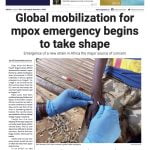To address the current situation regarding shortages of medicines, a pan-European approach is needed to harmonize data collection across Europe and encourage multidisciplinary discussions to find broad solutions, health experts say.
In a statement on the Shortages of Medicines, published on September 9, the Federation of European Academies of Medicine (FEAM) and its Member Academies called for a homogeneous approach to the shortages of medicines at the European level.
The multifaceted nature of the shortages amplifies the difficulty the EU is having in terms of assessing and defining, and, until recently, paying enough attention to the problem at both the national and European levels.
“A common European definition of shortages is needed to be able to assess the problem in a similar way across Europe and to collect data that are comparable and interoperable, enabling a joint appreciation of shortages and possible solutions”, the document says.
To tackle this challenge, the health experts suggest setting up a consultation process to find a common definition for drug shortages, involving all stakeholders.
The COVID-19 crisis has put shortages of critical medicines and protective equipment in the spotlight, raising the issue of where medicines are produced. In the statement, FEAM and its Member Academies stress that relocation of some of the production is needed.
“Knowing that 80% of prescribed medicines in Europe come from India and China and that not all of the production can be relocated in Europe, therefore it is important to focus on a few medicines that are most relevant”, the document says.
The statement also highlights that a definition of critical and essential medicines should be thought through to make sure these are prioritised to secure a continuous sufficient production level. “A list of essential and critical medicines could be drawn up and updated continuously”, the document states. This is also one of the key issues in the Commission’s communication on a Pharmaceutical Strategy for Europe.
Presented in November 2020, the communication on a Pharmaceutical Strategy for Europe includes a set of actions. The implementation of the strategy will span the mandate of this Commission and will notably see a proposal for revision of pharmaceutical legislation in 2022.
Key recommendations of the report:
- Promote a European approach to shortages of medicines to harmonise data collection throughout Europe and encourage multi-disciplinary and encompassing discussions to find broad solutions.
- Take actions at the EU level based on a commonly agreed definition of shortages as a result of an informed consultation process. The forthcoming EU legislation on the matter should take into consideration inputs from a wide range of actors and findings of the external study mapping root causes and assessing existing legislative frameworks. Initiatives put in place to respond to the immediate consequences of the pandemic should also be acknowledged and replicated if relevant.
- Foster cooperation at multiple policy levels, including national, European and international. Strong national commitments would play a key role in enhancing European capacity to deal with drug shortages. EU Agencies’ mandates should be revised and reinforced concomitantly with increasing resources in terms of staff and budget.
- Reinforce domestic production of certain medicines by relocating manufacturing units and ensure a good spread of supply sources to avoid over-reliance and dependency. Defining a list of critical medicines would be a step forward to prioritise which drugs should receive greater attention.






